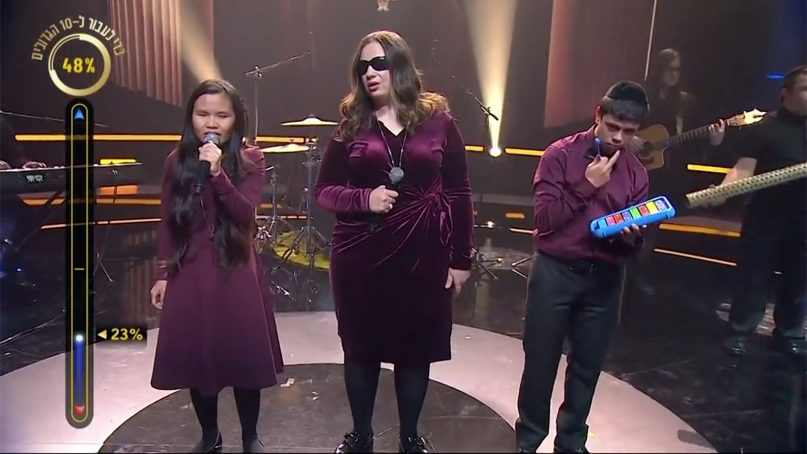JERUSALEM (RNS) – A popular Israeli band will appear in Eurovision 2019 when the international singing competition comes to Israel later this year.
But a dispute over performing on Shabbat means their hopes of representing Israel in the competition have been dashed.
The Shalva Band, a group of young musicians with a range of disabilities, won critical acclaim and a wide audience on social media in recent weeks after performing at a national song contest called The Rising Star.
The Shalva Band was one of four finalists in the contest. The winner will go on to represent Israel in the Eurovision Song Contest, an extravaganza that drew 186 million viewers in 2018. Israeli pop star Netta Barzilai won last year’s competition.
When the band learned that Eurovision contestants must take part in a rehearsal slated for Shabbat, it asked organizers to reschedule it so the musicians would not need to desecrate the Sabbath. Some of the band members are Orthodox Jews, and some are not.

The Shalva Band performs on the Rising Star competition in Israel. Video screenshot
Eurovision’s organizers said they cannot reschedule the final rehearsal slated for Shabbat because it is factored into the performers’ final score.
So the band dropped out of the competition.
“We could not be prouder of the remarkable journey that the Shalva Band has traveled; a journey that has just begun,” the group said in a statement. “When we look back at the past few months, we are astounded by the unbelievable impact that the Shalva Band has made, in Israel and all around the world.”
Despite this setback, the group accomplished what it had hoped to accomplish: to show the world that people with disabilities have many abilities and, when given the same opportunities afforded to others, can achieve great things.
The band was nurtured at Shalva, the Israel Association for the Care and Inclusion of Persons with Disabilities. The organization provides therapies, recreation, family respite care and job training to thousands of Israelis, from newborns to young adults.
Kalman and Malki Samuels, American-born Orthodox Jews who immigrated to Israel decades ago, founded the Jerusalem-based organization in honor of their son Yossi. He became blind, deaf and extremely hyperactive after receiving a faulty vaccination when he was 11 months old.
Much like Helen Keller before Annie Sullivan helped her connect with the world, Yossi was unable to communicate with others.
Malki Samuels vowed that if God would help her find a way to connect with Yossi, she would devote the rest of her life to help other families of children with disabilities. She and her husband launched Shalva in 1990, after Yossi, now an adult, experienced his own his Helen Keller-type breakthrough at the age of 7.
Some of the young people who grew up in the program formed a band of professional musicians who perform several times a week, according to the band’s bio.
Anael Khalifa and Dina Samteh, the band’s lead singers, are blind; Yair Pomburg and Tal Kima, who are percussionists, have Down syndrome; Yosef Ovadia, drummer and vocalist, has Williams’ syndrome; Guy Maman, who is visually impaired, plays the keyboard and sings. Shai Ben Shushan, the band’s director, is a disabled army veteran. Sara Samuels, a long-time volunteer with Shalva, plays guitar.
They took the Rising Star competition by storm.

Judges, left, talk with the Shalva Band on the Rising Star competition following a performance. Video screenshot
Seated in the audience during the band’s performance during Rising Star, Kalman Samuels fought back tears.
“There is nothing greater than this moment,” he said.
The Shalva Band’s Shabbat dilemma reflects a longstanding debate in Israel over its Jewish character and whether it should permit cultural, civic, sports and other public events to take place on Shabbat, when Jewish law prohibits religiously observant Jews from participating.
“This is a discussion that has been going on since before the founding of the state” in 1948, said Shuki Friedman, director of the Center for Religion, Nation and State at the Israel Democracy Institute.
“Will Shabbat be observed in merely a symbolic way, but with a special character, where people can do what they want and have the ability to do it? Or will Shabbat be observed in a more religious manner?” Friedman asked.
While many Israeli municipalities allow public recreational events to take place on Shabbat, fewer permit stores to be open and public transportation to operate.
“This prevents people who need or want to move from place to place to enjoy Shabbat the way they want,” Friedman said. “But prohibiting stores from opening prevents a situation where Shabbat-observant owners cannot compete with owners who keep their stores open.”
It also ensures that most Israeli employees get a proper day off once a week.

Judges, foreground, interview the Shalva Band on the Rising Star competition in Israel. Video screenshot
Uri Regev, a Reform rabbi and head of Hiddush — Freedom of Religion for Israel, called public Sabbath observance “a very tough issue,” especially because many Israelis work six days a week, with only Shabbat to rest. Non-Jews cannot be forced to work on their sabbaths.
“There isn’t a black-and-white response,” Regev said of the Shabbat open-or-close dilemma. “There are occasions when observant Jews are excluded from sports competitions because they take place on Shabbat. I’m very much in favor of accommodating individuals of all faiths whenever possible.”
But Regev doesn’t place the Eurovision contest in the same category.
“The Eurovision is an event we’re hosting but not organizing,” he noted. “The dilemma was, do we host it or tell them to go to hell,” as the country’s Orthodox politicians demanded?
“I think the numerous benefits and positive exposure to the country from hosting the event outweighs the infringement of the freedom of religion,” Regev said.
When the Shalva Band announced that it was withdrawing due to its Shabbat performance obligations, tens of thousands of Israelis called on the organizers to find a solution.
Although the band will not be competing in the Eurovision, it will be performing during an interval in the show, thanks to a decision by the Israeli company that will broadcast the show.
“Shalva dared to dream, and the Israel Broadcasting Corporation is happy it can help dreams come true,” the company said in a statement.
As for the band, it looks forward to taking part in Eurovision. The group’s future, said the Shalva organization, is bright:
“We are excited and looking forward. We will continue to strengthen and support you, to accompany you and embrace you, through whatever the future might hold, but we are certain that there will only be more and more successes.”





